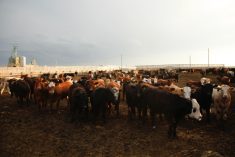With Canadian National Railway’s conductors and yard workers headed back to work, several Canadian grain groups now want to head off any future job action in the rail sector.
CN and the Teamsters Canada Rail Conference announced separately Tuesday they had reached a tentative agreement ending an eight-day strike by over 3,000 unionized staff.
The agreement called for affected employees to return to work starting at 2 p.m. local time Tuesday, with yard assignments starting at 6 a.m. Wednesday. There will be no job action while the unionized employees vote on whether to ratify the agreement, CN said.
Read Also

Alberta crop conditions improve: report
Varied precipitation and warm temperatures were generally beneficial for crop development across Alberta during the week ended July 8, according to the latest provincial crop report released July 11.
Results from the ratification vote are expected within about eight weeks, the company said. Meetings are to be held across the country to explain the terms of the agreement to members, after which the affected employees will vote on the deal through a secret-ballot electronic vote, the Teamsters said, adding the process “usually takes several months.”
Details of the tentative deal won’t be released until the members have had a chance to review it, the union said. The Teamsters have previously said wages were not a sticking point in contract talks, but focused instead on issues such as worker safety and fatigue, and CN’s proposal for a lifetime cap on prescription drug coverage.
The strike has been described as the longest such work stoppage in the rail sector in a decade. Rail labour disputes in recent years have ended relatively quickly, often under threat of federal back-to-work legislation.
CN, during the strike, repeatedly called on the Teamsters to return to work and submit their labour dispute to binding arbitration — an option the union rejected.
Teamsters Canada, in its release, thanked Prime Minister Justin Trudeau “for respecting workers’ right to strike.” Labour Minister Filomena Tassi, Transport Minister Marc Garneau and the Federal Mediation and Conciliation Service “were instrumental in helping parties find common ground,” the union added.
“Previous governments routinely violated workers’ right to strike when it came to the rail industry,” Teamsters Canada president Francois Laporte said in the union’s release. “This government remained calm and focused on helping parties reach an agreement, and it worked.”
“These agreements are further evidence that when employers and organized labour work together, we get the best results for Canadians and for our economy,” Garneau and Tassi said in a statement. “We congratulate and thank both CN and the Teamsters for staying at the table and coming to an agreement for the benefit of all Canadians.”
‘Real risk’
All that said, the work stoppage halted rail service, leaving grain traffic stalled on the Prairies and backing up shipments of propane, required by farmers across the country to fuel grain dryers during a particularly wet harvest season.
“We are extremely pleased to see this strike come to an end and we hope for very quick ratification for all parties,” Markus Haerle, chair of Grain Farmers of Ontario, said in a separate release Tuesday.
However, “many of our farmer-members desperately need propane to fuel grain dryers. We cannot sell wet corn and our crops were at real risk,” he said. “Farmers who had to find alternate drying means have suffered added costs and those that left corn in the field are dealing with deteriorating quality of their crop.
“We are hopeful that propane shipping will be seen as a high priority for everyone involved as the backlog of shipments is dealt with.”
Furthermore, he said, “it is very clear that rail is an essential service for this country. We expect the government will treat it as such in the near future.”
The idea of declaring rail an “essential service,” thus limiting future job action, found traction with other grain groups as well.
“While we’re grateful that the parties have come to an agreement, the federal government needs to take steps to ensure that grain farmers are not held ransom in the future. Rail service should be deemed an essential service,” Cherilyn Jolly-Nagel, a Saskatchewan director with the Western Canadian Wheat Growers Association, said Tuesday.
“The loss of two weeks of shipping time cannot be made up and it will take time to fill the backlog of cargo ships that are waiting in Vancouver,” the Wheat Growers said, adding CN “needs to use all available rolling stock and personnel to maximize the movement of grain.”
The Alberta Wheat and Barley Commissions concurred Tuesday, noting longshoremen in Canada “are already prevented from engaging in strikes that would impact the loading of grain vessels and the commissions believe those same provisions should be extended to rail.”
Thirty-five grain ships are reported to be waiting at Vancouver, some of which “will eventually incur demurrage penalties, which are ultimately charged back to farmers,” the commissions said Tuesday.
“The threat of strikes affecting grain movement is a recurring theme every few years and we need a long-term solution to ensure Canada can meet its export commitments,” Alberta Barley chair David Bishop said in the same release.
While not mentioning essential service rules, the Canadian Federation of Agriculture said Tuesday that “in light of this strike, (it) will be consulting its membership to determine ways in which potential future rail service interruptions do not negatively impact Canadian farmers.”
Quebec’s Union des producteurs agricoles concurred, with chairman Marcel Groleau saying Tuesday such a situation must never again occur, calling the matter a question of both economic and food security. — Glacier FarmMedia Network















